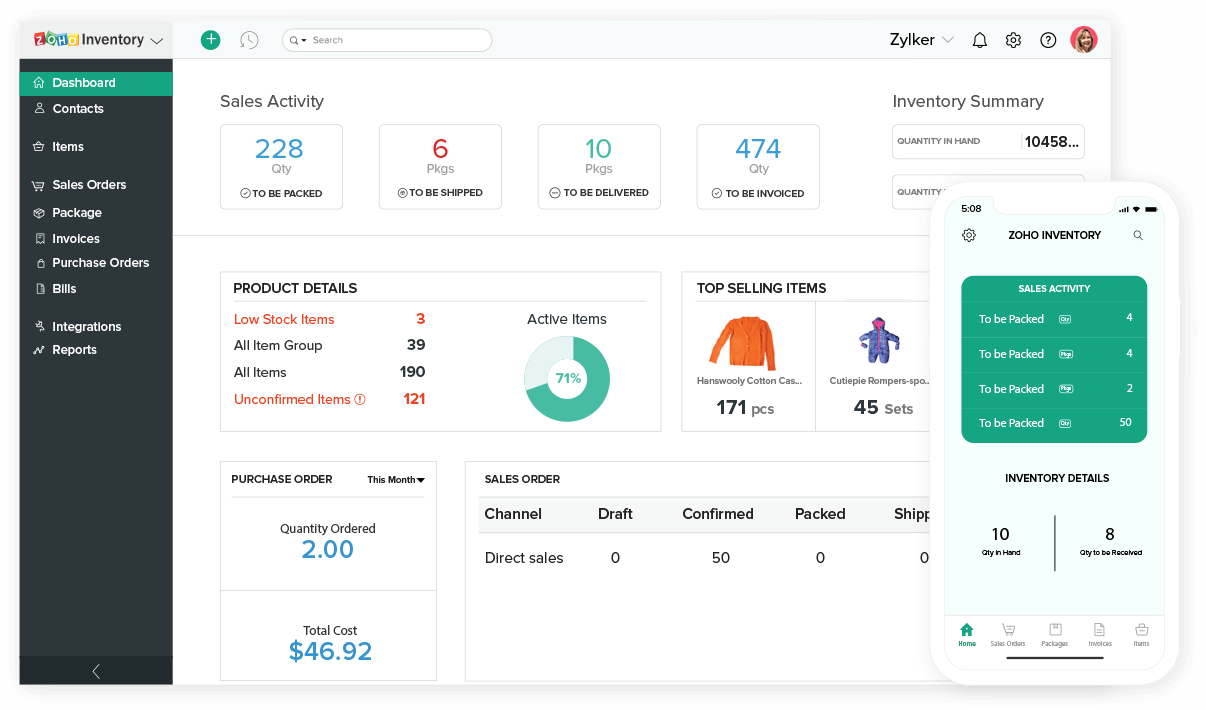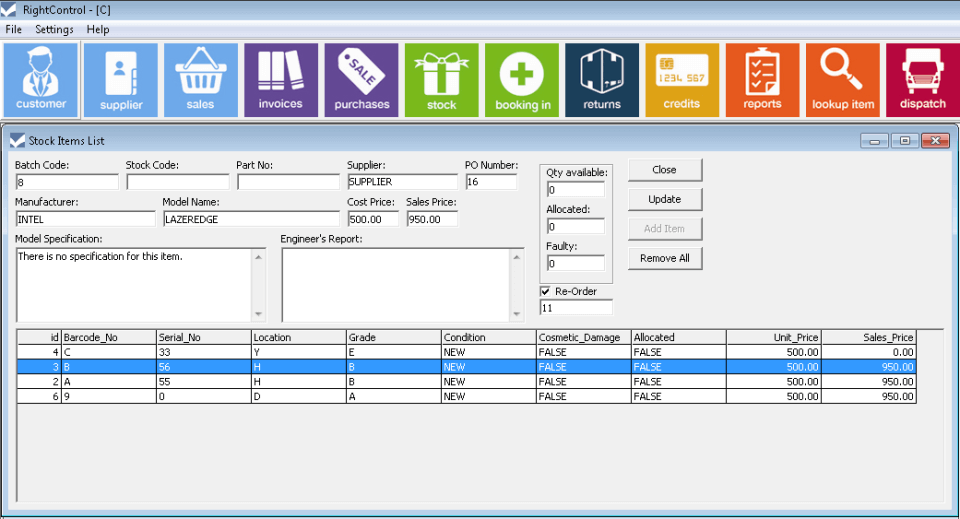Small business inventory and invoice software are essential tools for streamlining your operations, saving you time and money, and giving you the insights you need to make informed decisions. In this guide, we’ll explore the features, benefits, and trends of small business inventory and invoice software, and provide tips on choosing the right software for your business.
Inventory and invoice software can help you track your inventory levels, create and send invoices, and manage your customers. By automating these tasks, you can free up your time to focus on more important things, like growing your business.
Small Business Inventory and Invoice Software Market Overview

The market for small business inventory and invoice software is growing rapidly, as more and more small businesses recognize the benefits of using these tools to manage their inventory and billing processes.
Key trends in the market include the increasing adoption of cloud-based software, the growing popularity of mobile apps, and the integration of inventory and invoice software with other business systems.
Challenges, Small business inventory and invoice software
- One of the key challenges facing the market is the need for software that is affordable and easy to use for small businesses.
- Another challenge is the need for software that can be customized to meet the specific needs of different businesses.
Features of Small Business Inventory and Invoice Software
Small business inventory and invoice software offers a range of features that cater to the specific needs of small businesses. These features help businesses streamline their operations, manage their inventory effectively, and generate professional invoices.The core features of small business inventory and invoice software include:
- Inventory management:Allows businesses to track their inventory levels, set reorder points, and manage multiple warehouses or locations.
- Invoice creation and tracking:Enables businesses to create professional invoices, track payments, and send automated payment reminders.
- Customer management:Helps businesses manage customer information, track purchase history, and provide personalized experiences.
- Reporting and analytics:Provides insights into inventory levels, sales performance, and customer behavior through detailed reports and dashboards.
Using these features offers several benefits for small businesses:
- Improved inventory management:Reduces the risk of overstocking or understocking, optimizes inventory levels, and improves cash flow.
- Increased efficiency:Automates tasks such as invoice creation and tracking, freeing up time for other important tasks.
- Enhanced customer service:Provides access to customer information and purchase history, enabling businesses to provide personalized experiences and resolve issues quickly.
- Improved decision-making:Offers insights into inventory performance and customer behavior, helping businesses make informed decisions.
Benefits of Using Small Business Inventory and Invoice Software

Small business inventory and invoice software can provide a number of benefits for small businesses, including:
Improved accuracy and efficiency:Software can help businesses keep track of their inventory levels and invoices more accurately and efficiently. This can help reduce errors and save time.
Streamlined processes
- Automated inventory tracking
- Centralized invoice management
- Reduced manual labor
Enhanced customer service
- Faster order processing
- Improved communication with customers
- Increased customer satisfaction
Improved financial management
- Accurate inventory valuation
- Improved cash flow management
- Increased profitability
Enhanced reporting and analytics
- Generate custom reports
- Analyze sales trends
- Identify areas for improvement
How to Choose the Right Small Business Inventory and Invoice Software
Choosing the right inventory and invoice software for your small business is essential for streamlining your operations and increasing efficiency. With so many options available, it can be overwhelming to know where to start. Here’s a guide to help you make an informed decision:
Start by defining your business needs. Consider the size of your inventory, the number of invoices you process, and any specific features you require, such as barcode scanning or integration with other software. Determine your budget and timeframe for implementation.
Evaluate Different Software Options
Research and compare different software options. Read reviews, consult with industry experts, and schedule demos to get a hands-on experience. Consider the following factors:
- Ease of Use:Choose software that is intuitive and easy to navigate for all users.
- Functionality:Ensure the software meets your specific inventory and invoicing needs, including features such as product tracking, order management, and payment processing.
- Integration:Consider how the software integrates with your existing systems, such as your accounting or CRM software.
- Support:Evaluate the level of support offered by the software provider, including technical assistance, training, and updates.
Make a Decision and Implement
Once you have evaluated your options, select the software that best meets your needs and budget. Follow the implementation instructions carefully and train your team on how to use the software effectively. Monitor the software’s performance and make adjustments as needed to ensure optimal efficiency.
Case Studies of Small Businesses Using Inventory and Invoice Software
Inventory and invoice software can provide numerous benefits to small businesses. Several small businesses have successfully implemented this software, leading to improved efficiency, increased profitability, and enhanced customer satisfaction. Here are some case studies highlighting the specific benefits these businesses have experienced.
Successful Case Studies
Case Study 1: Online Retail Store
An online retail store struggled with managing its inventory and invoicing processes manually. After implementing inventory and invoice software, the business experienced significant improvements:
- Reduced inventory errors:Automated inventory tracking eliminated human errors, leading to accurate stock levels and reduced product loss.
- Improved invoice accuracy:Automated invoice generation reduced errors and ensured that invoices were sent promptly, improving customer satisfaction.
- Increased sales:The software provided real-time inventory visibility, enabling the store to optimize its product offerings and increase sales.
Case Study 2: Manufacturing Company
A small manufacturing company faced challenges in tracking its inventory and managing customer invoices. After adopting inventory and invoice software, the company achieved the following benefits:
- Optimized inventory levels:The software provided insights into inventory turnover and demand patterns, allowing the company to optimize its inventory levels and reduce storage costs.
- Improved cash flow:Automated invoicing and payment processing accelerated the billing process, improving cash flow and reducing accounts receivable.
- Enhanced customer service:Real-time inventory visibility enabled the company to provide accurate delivery dates to customers, improving customer satisfaction.
Future Trends in Small Business Inventory and Invoice Software

The future of small business inventory and invoice software is bright. As technology continues to evolve, we can expect to see even more innovative and user-friendly solutions that can help small businesses manage their inventory and invoicing more efficiently.
One of the most significant trends in small business inventory and invoice software is the increasing adoption of cloud-based solutions. Cloud-based software is hosted on remote servers, which means that small businesses can access their software from anywhere with an internet connection.
This can be a major advantage for small businesses that have employees who work remotely or who need to access their software from multiple locations.
Another trend in small business inventory and invoice software is the increasing use of artificial intelligence (AI). AI can be used to automate many tasks that are currently performed manually, such as data entry and invoice processing. This can free up small business owners and their employees to focus on more strategic tasks.
Integration with other business systems
Small business inventory and invoice software is becoming increasingly integrated with other business systems, such as accounting software and CRM systems. This integration can help small businesses to streamline their operations and improve efficiency.
Mobile accessibility
Small business inventory and invoice software is becoming increasingly mobile-friendly. This allows small business owners and their employees to access their software from anywhere, using their smartphones or tablets.
Last Point
Small business inventory and invoice software is a valuable investment for any small business. By choosing the right software and using it effectively, you can streamline your operations, save time and money, and gain the insights you need to make informed decisions.
As technology continues to evolve, we can expect to see even more innovative and user-friendly inventory and invoice software solutions in the future.
FAQ Compilation
What are the benefits of using small business inventory and invoice software?
There are many benefits to using small business inventory and invoice software, including:
- Save time and money by automating tasks
- Improve accuracy and efficiency
- Gain insights into your business
- Improve customer service
How do I choose the right small business inventory and invoice software?
There are a few things to consider when choosing small business inventory and invoice software, including:
- Your business needs
- Your budget
- The features you need
- The ease of use
What are the trends in small business inventory and invoice software?
Some of the trends in small business inventory and invoice software include:
- Increased use of cloud-based software
- Integration with other business applications
- More user-friendly interfaces
- Increased use of mobile apps
